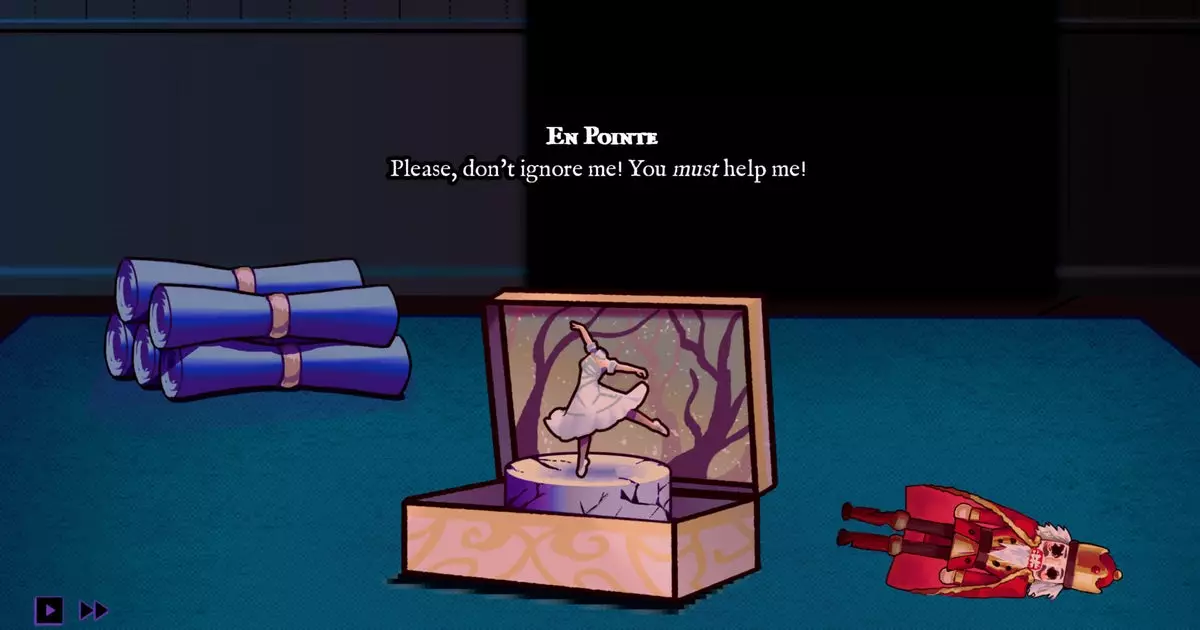When one hears the title “Toy Box,” it may evoke light-hearted imagery of childhood joy and festive celebrations. However, delving deeper into its narrative reveals that this visual novel diverges far from the cheery themes typically associated with the holiday season. In fact, the game presents a chilling exploration of morality, compassion, and duty, bolstered by a gameplay experience that challenges the player’s ethical boundaries. As players assume the role of a toy inspector for a whimsical yet ominous Grand Toy Maker, they grapple with the haunting realization that the toys they dismantle are not mere objects but sentient beings pleading for their existence.
This initial contrast is striking: a friendly toy manufacturer shrouded in mystery, juxtaposed against grotesque and often malevolent toys. The instructions for dismantling these toys, which at first may seem innocuous, lead players into a labyrinth of emotional conflict. One is not just repairing or destroying; they are confronted with the moral weight of their choices: to salvage living toys or condemn them to a fiery end.
The act of disassembling toys, infused with vivid and often disturbing memories, creates a riveting psychological tableau. Players are thrust into an environment where their very decisions echo ethical implications—every toy tells a story laced with horror, its narrative intricately woven with themes of suffering and despair. For instance, a talking ballerina, with its pleading voice, becomes a poignant figure, transforming an act of maintenance into a harrowing moral dilemma. The innocent facade of toys belies their darker undertones, challenging not just the inspector’s judgment but the player’s emotional resilience as well.
There’s an unnerving sense of agency in “Toy Box.” The player is granted the autonomy to choose between salvaging or sentencing these unique artifacts to fate, all while being observed by the Grand Toy Maker. This oversight serves as a constant reminder of accountability, compelling players to consider how their actions, albeit digital, are mirrored in the real world’s moral complexities. Can one truly abdicate responsibility for the choices they make, even in a fictional context?
One of the most compelling aspects of “Toy Box” lies in its rich narrative layers. The game does not shy away from its more gruesome elements; rather, it integrates them as vehicles for storytelling. The use of content warnings is extensive and foreboding, covering a plethora of topics that range from body horror to religious themes. Such an explicit framing challenges players to confront their discomfort head-on, potentially reshaping their understanding of narrative boundaries within video games.
Interestingly, these heavy themes resonate with the legacy of toys, artifacts often linked to childhood innocence and family values. However, the game’s execution flips this narrative, embedding sinister undertones into the very fabric of what toys represent. The decision by DEADline Studios to embrace unsettling content allows them to craft a unique aesthetic that stands apart in the gaming landscape.
“Toy Box” raises intriguing questions about the medium of video games, challenging developers and players to explore the depths of human emotion and experience beyond surface-level entertainment. The unsettling experience echoes aspects of embedding lore within dark fiction, reminiscent of philosophical horror epitomized by figures like Thomas Ligotti. It encourages players to navigate the murky waters of empathy, forcing them to traverse the boundary between creator and destroyer.
Moreover, the involvement of a small POC and Queer-owned studio emphasizes a commitment to representing diverse perspectives in gaming. In a medium often dominated by homogenized narratives, “Toy Box” strives to share stories that explore the multifaceted nature of humanity, including its darkest recesses. This artistic intention infuses the game with intention, allowing the player to venture into themes that provoke introspection rather than mere entertainment.
“Toy Box” stands as more than just a horror visual novel; it is an innovative exploration of human ethics, morality, and the stark dichotomy between joy and despair. By reframing the role of toys from objects of wonder into vessels of chilling narratives, the game invites players to confront their own underlying sentiments about life, death, and existence. Ultimately, “Toy Box” paves the way for future explorations of the intersection between horror, empathy, and storytelling in the gaming industry, encouraging developers to embrace complexities that elicit deeper emotional involvement from their players.


Leave a Reply